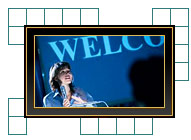| "TKO
Video Communications can help you to create a lasting
impression on your audience - it's all in the smallest
of details." |
|
-
Brandon Wehmer, Communications Specialsts
|
A Multi-Site meeting (using satellite broadcasting, video
conferencing and the possible combination of both) should
be thought of and planned as a sequence of segments.  Each
segment must support the primary message. This key message
is delivered by the keynote speaker and possibly by additional
speakers or panel members. Each
segment must support the primary message. This key message
is delivered by the keynote speaker and possibly by additional
speakers or panel members.
The
Segments
Segments should repeat and reinforce the primary theme of
the meeting and they should span from 30 - 90 minutes each.
An example would be a segment that is 30 minutes in length
on a supporting topic to the keynote message with a 15-minute
round-robin question and answer period.
Each
segment can include its own anchor message (like a sub-keynote),
panel discussion and question and answer session. Most importantly,
each segment must allow for regional discussion or interaction
that is unique and valuable to each location and which supports
the original keynote message. This is key to keeping each
regional Meeting Center engaged fully with the meeting.
The
Participants
Participants need time to assimilate new information and
should be given the opportunity to clarify understanding,
offer feedback, and to discuss the information with participants
at their own location. This can be done formally in a round
robin interaction between each Meeting Center with the Host
Site or informally by allowing attendees time to interact
during breaks or at a meeting's conclusion.
Below
is an example of a two-hour meeting schedule. Note that
the two hours includes time for attendees to discuss the
meeting upon its conclusion. All meetings of importance
should accommodate guests that interact with one another
during breaks and at the conclusion of a meeting. No less
than 15 minutes of time for guests to associate on breaks
or after a meeting is recommended.
The
Schedule
A typical 120-minute (2 hour) meeting schedule takes 10
hours to rehearse, setup, run and take down.
An
example of a Multi-Site meeting that begins at 10:00 AM
would be programmed shown below. Note the requirements for
Production of the event start the day prior to the meeting
itself.
| |
Participant
Time Frames |
| |
Introductions
of Meeting and each remote location (5-10 minutes) |
| |
Introduction
to program or meeting agenda 5 minutes |
| |
Main
presentation 30-45 minutes |
| |
Q
& A 20-30 minutes |
| |
Regional
Time to discuss message 15-20 minutes |
| |
Production Time Frames |
| |
Day
prior rehearsal start time 3:00 PM |
| |
Day
prior rehearsal end time 5:00 PM |
| |
Suggested
Event Date setup start time: 6:00 AM |
| |
Suggested
Event Day program test: 8:00 AM |
| |
Suggested
Event Day program start: 10:00 AM |
| |
Scheduled
Event Day meeting end time: 12:00 PM |
| |
Suggested
network down time: 12:30 PM |
| |
Closure
of the venue to participants: 1:00 PM |
| |
Breakdown
and clean up time: 2:00 PM |
Catering
Every Multi-Site event should include a beverage service.
For events that exceed 90 minutes, a snack service should
be included. Meals change the character of a business meeting
and should be considered only for full day sessions spanning
lunch or dinner hours.
The
exception to this is breakfast. Multi-Site meetings that
begin at or before 9:00 AM should typically include a continental
breakfast and beverage service.
Continue
to next page
About
TKO
TKO Video Communications distinguishes itself from other
vendors by providing high quality video conference outsourcing,
video products, broadcasting via satellite and other communications
solutions with unparalleled attention to customer objectives.
Conferencing
Equipment | Outsourcing
| Systems
| Tandberg
|
550 | 880
|